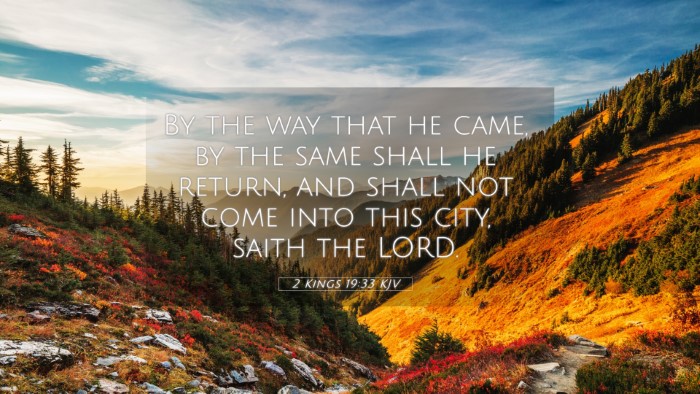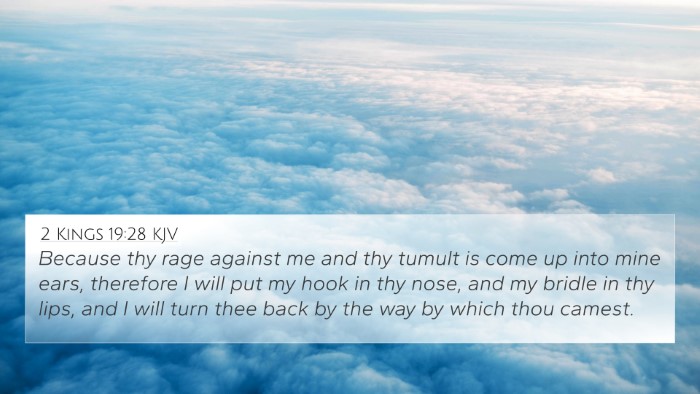Understanding 2 Kings 19:33
Verse Reference: 2 Kings 19:33 (KJV) - "By the way that he came, by the same shall he return; and shall not come into this city, saith the LORD."
Overview of 2 Kings 19:33
This verse is part of a larger narrative concerning King Hezekiah’s prayer for deliverance from the Assyrian siege led by King Sennacherib. The verse emphasizes God’s promise that Sennacherib would not enter Jerusalem, asserting His sovereign power over nations and their leaders.
Commentary Insights
- Matthew Henry: Henry emphasizes the assurance God gives to Hezekiah through the prophecy, reinforcing the idea of divine protection over Jerusalem. God communicates that the Assyrian king will not succeed in his campaign, illustrating the broader theme of God’s sovereignty.
- Albert Barnes: Barnes provides insight into the geographical context, explaining that Sennacherib's return "by the same way" emphasizes God's control over military movements. It signifies that even a powerful king must adhere to God's will, showcasing the futility of opposing divine authority.
- Adam Clarke: Clarke focuses on the larger implications of this promise, interpreting it as a demonstration of God’s justice and mercy. Clarke notes that God intervenes to preserve His people, a consistent theme throughout the Old Testament.
Thematic Analysis and Cross-References
2 Kings 19:33 resonates with several other passages in the Bible. Below are some important connections through cross-referencing:
Related Bible Verse Cross-References:
- Isaiah 37:29: "Because thy rage against me and thy tumult is come up into mine ears, therefore will I put my hook in thy nose, and my bridle in thy lips, and I will turn thee back by the way by which thou camest."
- 2 Chronicles 32:21: "And the LORD sent an angel, which cut off all the mighty men of valour, and the leaders and captains in the camp of the king of Assyria. So he returned with shame of face to his own land."
- Psalm 46:1-2: "God is our refuge and strength, a very present help in trouble. Therefore will not we fear, though the earth be removed, and though the mountains be carried into the midst of the sea."
- Isaiah 31:4: "For thus hath the LORD spoken unto me, Like as the lion and the young lion roaring on his prey, when a multitude of shepherds is called forth against him, he will not be afraid of their voice, nor abase himself for the noise of them: so shall the LORD of hosts come down to fight for mount Zion and for the hill thereof."
- Romans 8:31: "What shall we then say to these things? If God be for us, who can be against us?"
- Job 5:12: "He disappointeth the devices of the crafty, so that their hands cannot perform their enterprise."
- Proverbs 21:30: "There is no wisdom nor understanding nor counsel against the LORD."
Understanding Biblical Connections
Exploring thematic Bible verse connections enhances our understanding of 2 Kings 19:33 by situating it within the broader narrative of divine sovereignty, protection, and intervention. God’s assurance to Hezekiah serves as a repetitive theme in both the Old and New Testaments, demonstrating His desire to protect His people.
Conclusion
In summary, 2 Kings 19:33 provides profound insights into God’s character as a protector and sovereign ruler. Cross-referencing with related Biblical texts deepens our comprehension of divine providence and the assurance that God is actively involved in the affairs of His people. For those engaged in cross-referencing Bible study methods, examining these themes can enhance personal study and preparation for sharing God’s word effectively.




